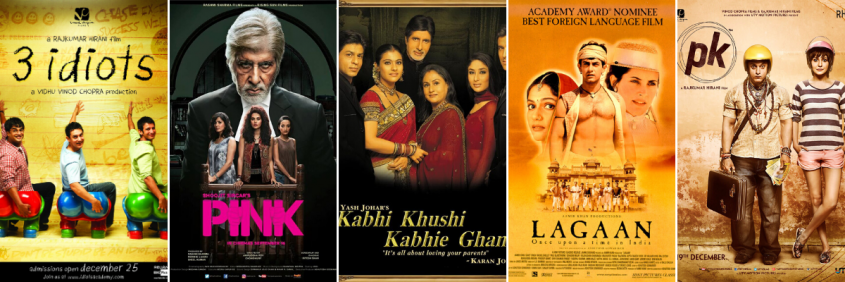Fourth year Co-op Management and Marketing program student, Rohil Kishinchandani, whose father works in the Indian film industry, gave us his list of top five Bollywood movies.
He starts off with the disclaimer that selecting 5 top favourites amongst thousands of Bollywood movies is literally like choosing the top 5 students in a school full of bright students. He states, “The top 5 I have chosen are movies that are not only entertaining but also leave you with a very strong message. They have had an impact on our Indian society and at some level brought about a change.”
He goes on to say that the films that leave an impact on him are ones which advocate values in life, family, or otherwise, and ones that push you to think beyond what you have always believed and accepted.

1) 3 Idiots – 2009
The movie follows the friendship of three students at an Indian engineering college, and is a satire based on the Indian education system and the social pressures to follow certain tried and tested fields in order to be successful. Two friends search for a lost companion, who had inspired them to think differently, even as the rest of the world called them “idiots”, and what unfolds is a journey of meaning and social messages.
For Kishinchandani, there are ever present societal pressures when it comes to education in some parts of India. “If you are born a boy, you should get into the engineering field and as a girl, the field of medicine is very reputed,” he says. 3 Idiots tackles issues of coping with typical pressures of student life, and ventures into the importance of following your own path versus the stream imposed by others. “What it reinforced is that one should not chase success; one should chase excellence and success will follow.”
2) Pink – 2016
This Bollywood blockbuster tackles the issue of India’s rape culture, no means no, and the Indian justice system. After a girl is molested, misogynistic traits of stalking and rape threats become central themes in the film. Three men, who are politically connected, begin stalking and terrorizing the three girls who had mustered courage to lodge a complaint. “This film is important to me because it spoke about the very important issue of consent and what it actually means vis-à-vis what we have grown up believing it to be.”
For Kishinchandani Pink brings into focus the biased thought process of blaming the girl for rape or sexual abuse, just because she chooses to dress in a particular way or have a drink or two. “I have grown up with the values of courtesy, respect, and chivalry, but that’s not the case for majority of the society in India, which is still patriarchal to a certain extent. I was glad someone had the guts to make a film that focused on this critical issue in India.”
Pink ends with a victory for the girls, but the patriarchal menace that threatens Indian women from leading safe and independent lives lingers.
3) Kabhi Khushi Kabhie Gham – 2001 (Sometimes happiness, sometimes sorrow)
Considered a Bollywood classic that saw major commercial success, the film tells the story of an Indian family that faces troubles and misunderstandings over their adopted son's marriage to a girl belonging to a lower socio-economic group.
Going against the wishes of his parents, the main character, Rahul, is disowned by his father after marrying a poor woman. He moves to London to build a new life, and later learns that his younger brother has embarked on a mission to bring him back home to reunite with his family.
Kishinchandani selected this film stating, “It tackles issues of classism and making independent choices, which is not exactly encouraged in a typical Indian family. The film is very emotional and just like the title suggests, it talks about the ups and downs in life, the fact that life is a blend of happy and sad moments, and that one has to move on, but how the role of a family is so important in this journey called life.”
4) Lagaan – 2001 (Taxation)
The people of a small village stake their future on a game of cricket against the British rulers. Taking place in the 1800s, Lagaan is a battle without bloodshed, fought by a group of unlikely heroes under extraordinary circumstances.
Faced with the injustice of being overtaxed by the ruling British at the time, the villagers use the game of cricket as a wager to avoid the taxes that are crippling their village. Kishinchandani says, “India is a cricket-crazy nation and some of our heroes and role models are cricketers. But this film showcases the time when India had not been introduced to the game yet. Cricket was a game played by British alone, and challenging them to their own game to help waive off their taxes was sheer recklessness, and kept me completely on the edge of the seat.”
“This film is about seeing problems as opportunities and taking risks if there is even a slight chance of winning”, underlines Kishinchandani. Displaying faith and courage, they come face to face with arrogance and ruthlessness, but the result of the cricket match changes their village’s destiny.
5) P.K. – 2014 (Drunk)
Interestingly, this film is directed by Kishinchandani’s uncle, and at the time emerged as the highest grossing Indian film of all time.
Not your typical plot, the story follows an alien who comes to Earth on a mission to learn about the people who live there. He loses his remote to a thief and does not have a way to return back to his planet. His quest to retrieve his remote leads him on a journey that helps him understand the people living there and their religious practices and superstitions, all while exploring some complex philosophies.
Kishinchandani says, “When you have grown up seeing things in a particular way, you don’t question them too much. But suddenly, when you start seeing things from the point of view of a newcomer in your society and in this case, an alien unfamiliar with the ways of the humans, it shows you things in a completely different light.”
The alien’s reactions and his innocent questioning of things makes people believe that he is a drunkard, and he earns himself the nickname of PK, meaning drunk in Hindi. Though his questions are child-like, they bring about answers that challenge the status quo, and people are forced to see the world that they have known for generations through PK’s eyes.
“On the face of it, it’s a story about humanity and its beliefs, but on a more subtle level, it’s actually a story of hope and of the people who make a business off of the blind faith of humanity,” says Kishinchandani.
“Hundreds of movies are made in India each year, but ones that leave you with something are always remembered”, he concludes
